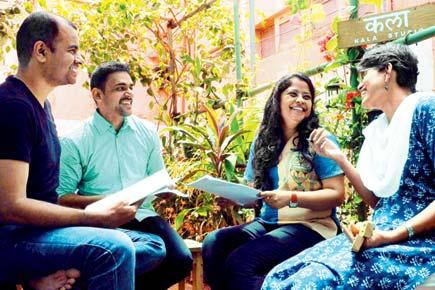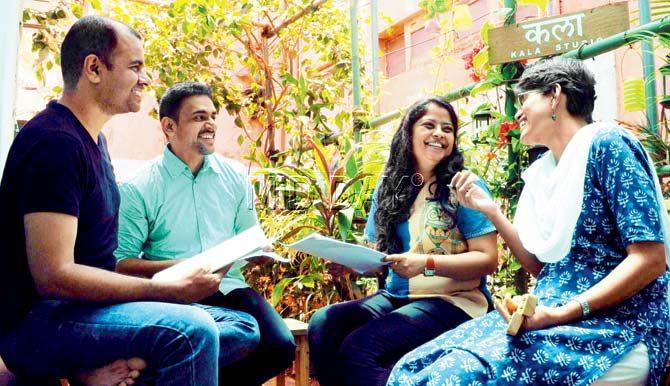A small garage in a Khar lane is being converted into a space where playwrights and authors can freely exchange ideas

 A 230-square-feet garage-turned-studio, located on 17th road Khar, holds a promise for the city’s Marathi theatre and literature enthusiasts. The space, moderately used for tutorial classes and sundry photo shoots, will now light up with play readings, writers’ sharing sessions and some laughter over tea. The Baithak (sit-in) to begin from August 7 adds an interesting dimension to Mumbai’s track record of carving performance spaces out of school halls, warehouses, terraces and public parks.
A 230-square-feet garage-turned-studio, located on 17th road Khar, holds a promise for the city’s Marathi theatre and literature enthusiasts. The space, moderately used for tutorial classes and sundry photo shoots, will now light up with play readings, writers’ sharing sessions and some laughter over tea. The Baithak (sit-in) to begin from August 7 adds an interesting dimension to Mumbai’s track record of carving performance spaces out of school halls, warehouses, terraces and public parks.
The garage, now to be called Kala Studio, is a plot owned by artist-photographer-architect Kunal Vijayakar who has loaned the space, free of cost, to Kali Billi Theatre Productions on the first Sunday evening of every month. Depending on the response and the numbers that gather at the Khar Danda location, Vijayakar will see if varied stakeholders and theatre directors can be roped in.
ADVERTISEMENT

Bhushan Korgaonkar, Kunal Vijaykar, Manisha Korde and Anupama Joshi at Kala Studio in Khar West. Pic/Datta Kumbhar
Vijaykar’s preference for Kali Billi has a reason. He has been associated, as an actor and backstage support in the group's popular production Sangeet Bari. While presenting the showcase of lavani performances in the last two years, Vijaykar spoke at length about space and its possibilities with director Savitri Medhatul and lavani researcher Bhushan Korgaonkar.
The trio felt that while the city has offered special corners for readings, discussions and huddles, there was no exclusive space for those expressing themselves in Marathi. As they visualised the space where authors could face their readers or dancers hold lecture demonstrations or stage performers read out a relevant piece of literature that suffuses their work, Vijaykar proposed that the garage of his ancestral house be put to use, to assess if the face-to-face Baithak concept clicks. He had decorated the garage a while ago and named it Kala Studio, bearing relevance to the art gallery once mounted by his grandfather in the adjoining flat. Incidentally, the Vijaykars belong to the Pathare Prabhu community — the original settlers of Mumbai — and Kunal’s grandfather Mukundrao was the former dean of the JJ School of Art. The Kala Studio is geographically located near another landmark — a school named after the legendary writer of Marathi short stories, G A Kulkarni. Thus, things seem to fall in place, some planned some unwittingly, that could go into the making of a cozy hub for Marathi writers, artists, actors and patrons who have experienced similar offerings by the Awishkar group (evoking the magic of a live performance with limited means) in the famed Chhabildas school and later at a school in Mahim.
The blueprint for the first two-hour baithak is out on a Facebook page and WhatsApp network, which will facilitate the first-come first-served pre-registeted attendance in a hall that can take around 50 patrons squatting on the floor. Korgaonkar adds in jest, “We have not factored in a stampede of (walk-in) patrons or an attendance that will be beyond our logistics. But, we will be only too happy to find an audience of that scale, which will also validate our jointly felt need to start something.” Every session will seek voluntary contributions which will cover the travel cost of guest speakers from outside Mumbai. “Instead of brooding over the lack of conversation spaces, we thought of the next step. We are aware that ours is a tiny space without a green room, but it is big enough to thrash out scripts and savour poetry,” Vijaykar says.
Baithak’s opening coincides with the death anniversary of one of the city’s most active theatre directors — Chetan Datar passed away in August eight years ago. He believed in minimalistic theatre, etching an innate human experience without the frills of elaborate sets, lights, make-up and costumes, as manifest in memorable Marathi renderings based on Kaneto Shindo’s Children of Hiroshima and Miro Gavran's An Actor Dies But. Datar was known for tailoring scripts out of other literary forms. Baithak’s first offering is also an amalgamation of writers (conceptualised by Yugandhar Deshpande) in which authors (they change in every show; this one has the well-known Marathi-Hindi writer Manisha Korde, most known for the funny dialogues of Malamaal Weekly and Billu Barber) present their work through readings. The content varies from verse to pen portraits to non-fiction.
The August 7 Baithak will have four voices spanning 90 minutes, followed by an interaction. The next will feature Shahu Patole, a writer on the Marathwada food culture whose book Anna He Apoorna Bramha chronicles out-of-the-world recipes.
The writer, known for strong views on how upper caste food habits eclipse the amazingly rich lower caste cuisine, will be interviewed on the pop culture interpretation of niche culinary cultures. The third Baithak (October 2) will present dancer Vaibhav Arekar’s lecture demo.
Baithak brings multi-hued voices to the fore, not necessarily the ones with metro mass appeal. As director Medhatul adds, “It will not focus on the commonly and easily available mass market stuff, because the audience (40 to 50) is select and obviously has the patience for theme-based discussions. For instance, Patole's book mentions recipes (some fermented ones) which originated from the begging culture of below-poverty line communities. This is definitely not the feel-good cookery stuff that television entertainment is made of. Baithak accounts for the amusing and yet intensely human aspect.”
Baithak promoters feel it is a win-win idea. If Kala Studio evokes limited interest, they will gain a meeting point to interact intimately with a niche audience. If the response is unmanageably positive, the gappa goshti will transition into a bigger baithak.
Sumedha Raikar-Mhatre is a culture columnist in search of the sub-text
 Subscribe today by clicking the link and stay updated with the latest news!" Click here!
Subscribe today by clicking the link and stay updated with the latest news!" Click here!







